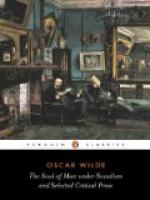the Lords Spiritual have nothing to say, and the House
of Commons has nothing to say and says it. We
are dominated by Journalism. In America the
President reigns for four years, and Journalism governs
for ever and ever. Fortunately in America Journalism
has carried its authority to the grossest and most
brutal extreme. As a natural consequence it
has begun to create a spirit of revolt. People
are amused by it, or disgusted by it, according to
their temperaments. But it is no longer the real
force it was. It is not seriously treated.
In England, Journalism, not, except in a few well-known
instances, having been carried to such excesses of
brutality, is still a great factor, a really remarkable
power. The tyranny that it proposes to exercise
over people’s private lives seems to me to be
quite extraordinary. The fact is, that the public
have an insatiable curiosity to know everything, except
what is worth knowing. Journalism, conscious
of this, and having tradesman-like habits, supplies
their demands. In centuries before ours the
public nailed the ears of journalists to the pump.
That was quite hideous. In this century journalists
have nailed their own ears to the keyhole. That
is much worse. And what aggravates the mischief
is that the journalists who are most to blame are not
the amusing journalists who write for what are called
Society papers. The harm is done by the serious,
thoughtful, earnest journalists, who solemnly, as
they are doing at present, will drag before the eyes
of the public some incident in the private life of
a great statesman, of a man who is a leader of political
thought as he is a creator of political force, and
invite the public to discuss the incident, to exercise
authority in the matter, to give their views, and
not merely to give their views, but to carry them into
action, to dictate to the man upon all other points,
to dictate to his party, to dictate to his country;
in fact, to make themselves ridiculous, offensive,
and harmful. The private lives of men and women
should not be told to the public. The public
have nothing to do with them at all. In France
they manage these things better. There they do
not allow the details of the trials that take place
in the divorce courts to be published for the amusement
or criticism of the public. All that the public
are allowed to know is that the divorce has taken
place and was granted on petition of one or other
or both of the married parties concerned. In
France, in fact, they limit the journalist, and allow
the artist almost perfect freedom. Here we allow
absolute freedom to the journalist, and entirely limit
the artist. English public opinion, that is to
say, tries to constrain and impede and warp the man
who makes things that are beautiful in effect, and
compels the journalist to retail things that are ugly,
or disgusting, or revolting in fact, so that we have
the most serious journalists in the world, and the
most indecent newspapers. It is no exaggeration




